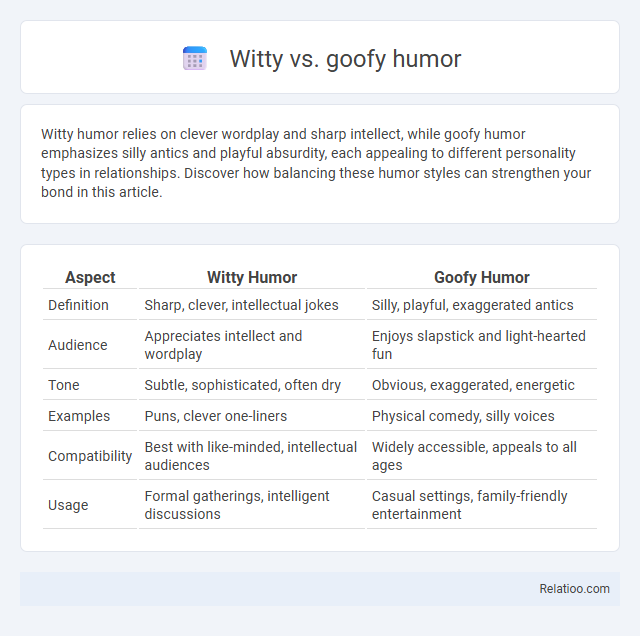Witty humor relies on clever wordplay and sharp intellect, while goofy humor emphasizes silly antics and playful absurdity, each appealing to different personality types in relationships. Discover how balancing these humor styles can strengthen your bond in this article.
Table of Comparison
| Aspect | Witty Humor | Goofy Humor |
|---|---|---|
| Definition | Sharp, clever, intellectual jokes | Silly, playful, exaggerated antics |
| Audience | Appreciates intellect and wordplay | Enjoys slapstick and light-hearted fun |
| Tone | Subtle, sophisticated, often dry | Obvious, exaggerated, energetic |
| Examples | Puns, clever one-liners | Physical comedy, silly voices |
| Compatibility | Best with like-minded, intellectual audiences | Widely accessible, appeals to all ages |
| Usage | Formal gatherings, intelligent discussions | Casual settings, family-friendly entertainment |
Defining Witty and Goofy Humor
Witty humor relies on clever wordplay, quick thinking, and intellectual sharpness, often invoking puns, irony, and sophisticated references. Goofy humor centers on physical comedy, exaggerated expressions, and playful silliness that evoke laughter through absurdity and childlike antics. Both styles enrich humor by appealing to different cognitive and emotional responses, with witty humor engaging the mind and goofy humor sparking spontaneous amusement.
Key Characteristics of Witty Humor
Witty humor is characterized by quick, clever wordplay and sharp timing that engages your intellect and creativity. Unlike goofy humor, which relies on physical comedy and absurd situations, witty humor thrives on subtlety, clever puns, and intelligent observations. Your appreciation for humor is enhanced by recognizing its nuanced contrasts, especially the sophistication inherent in witty exchanges.
What Makes Humor Goofy?
Goofy humor is characterized by exaggerated physical comedy, ridiculous situations, and playful absurdity that often prioritize silliness over intellectual wit. Unlike witty humor, which relies on clever wordplay and sharp observations, goofy humor aims to evoke laughter through slapstick antics and exaggerated facial expressions. This type of humor taps into a childlike sense of fun and spontaneity, making it accessible and instantly relatable.
Psychological Impact: Witty vs Goofy Jokes
Witty humor, characterized by clever wordplay and quick thinking, typically stimulates higher cognitive engagement, enhancing mental agility and promoting social bonding through intellectual appreciation. Goofy humor, marked by silly, exaggerated, and often absurd elements, tends to lower stress by triggering laughter through physical comedy and playful absurdity, fostering emotional relief and a sense of childlike joy. Both forms positively impact psychological well-being but do so through different mechanisms--witty jokes engage the brain's executive functions, while goofy jokes activate the limbic system's pathways associated with happiness and relaxation.
Audience Preferences: Who Enjoys What?
Audience preferences for witty versus goofy humor vary based on cognitive engagement and social contexts, with witty humor appealing to those who enjoy clever wordplay, irony, and subtlety, often attracting intellectuals and professionals. Goofy humor resonates more with individuals seeking lighthearted, physical comedy and slapstick, typically preferred by younger audiences and those looking for straightforward, unpretentious laughter. Understanding your audience's taste helps tailor humor effectively, ensuring your message connects and entertains as intended.
Examples of Witty Versus Goofy Comedy
Witty humor features clever wordplay, sharp comebacks, and intelligent observations, as seen in Oscar Wilde's epigrams or the quick exchanges in "Gilmore Girls." Goofy humor relies on physical comedy, silly antics, and exaggerated expressions, exemplified by Jim Carrey's roles in "Ace Ventura" or the slapstick style of "The Three Stooges." Your appreciation for humor often depends on whether you enjoy mental agility or lighthearted, absurd escapades.
Witty and Goofy Humor in Pop Culture
Witty humor thrives on clever wordplay and sharp intellect, often seen in iconic TV shows like "The West Wing" and stand-up routines by comedians such as Stephen Fry, making your conversations lively and intellectually engaging. Goofy humor centers on physical comedy and silly antics, exemplified by characters like Mr. Bean and Jim Carrey's performances, which bring light-hearted joy and universal appeal. While general humor covers a broad range of comedic styles, pop culture distinctly highlights witty and goofy humor as cornerstones of entertainment that cater to diverse audiences.
Social Contexts: When to Use Each Type
Witty humor thrives in intellectual or professional social contexts where clever wordplay and quick thinking can impress and engage an audience. Goofy humor suits informal, relaxed environments like family gatherings or casual hangouts, fostering connection through silliness and lightheartedness. General humor adapts broadly but selecting witty or goofy humor depends on audience sophistication and the desired social tone.
Blending Witty and Goofy Humor
Blending witty and goofy humor creates a dynamic comedic style that balances clever wordplay with playful absurdity, appealing to a wide audience by engaging both intellectual and lighthearted sensibilities. Your ability to seamlessly integrate sharp, quick-thinking jokes with silly, exaggerated antics enhances relatability and keeps conversations lively and entertaining. This fusion of humor types fosters a unique connection, making interactions memorable and fun.
Which Humor Wins: Timelessness and Trends
Witty humor, characterized by sharp intelligence and clever wordplay, often remains timeless due to its subtlety and intellectual appeal, contrasting with goofy humor, which relies on exaggerated silliness and physical comedy that appeals more to current trends and immediate laughter. General humor encompasses a broad range of styles but tends to fluctuate in popularity based on cultural shifts and audience preferences. Witty humor typically wins in longevity, maintaining relevance across generations, while goofy humor thrives in momentary trends and casual entertainment.

Infographic: Witty vs Goofy humor
 relatioo.com
relatioo.com